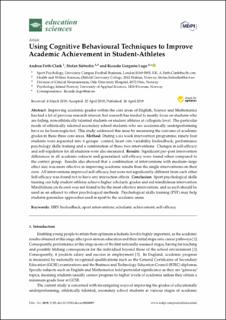| dc.contributor.author | Firth, Andrea | |
| dc.contributor.author | Sütterlin, Stefan | |
| dc.contributor.author | Lugo, Ricardo Gregorio | |
| dc.date.accessioned | 2020-04-03T13:46:04Z | |
| dc.date.available | 2020-04-03T13:46:04Z | |
| dc.date.created | 2019-04-22T14:52:44Z | |
| dc.date.issued | 2019 | |
| dc.identifier.citation | Education Sciences. 2019, 9 (2). | |
| dc.identifier.issn | 2227-7102 | |
| dc.identifier.uri | https://hdl.handle.net/11250/2650375 | |
| dc.description | © 2019 by the authors. Licensee MDPI, Basel, Switzerland. This article is an open access article distributed under the terms and conditions of the Creative Commons Attribution (CC BY) license (http://creativecommons.org/licenses/by/4.0/). | en_US |
| dc.description.abstract | Abstract: Improving academic grades within the core areas of English, Science and Mathematics has had a lot of previous research interest, but research has tended to mostly focus on students who are failing, non-athletically talented students or student athletes at collegiate level. The particular needs of athletically talented secondary school students who are academically underperforming have so far been neglected. This study addressed this issue by measuring the outcome of academic grades in these three core areas. Method: During a six week intervention programme, ninety four students were separated into 4 groups: control, heart rate variability biofeedback, performance psychology skills training and a combination of these two interventions. Changes in self-efficacy and self-regulation for all students were also measured. Results: Significant pre–post intervention differences in all academic subjects and generalised self-efficacy were found when compared to the control group. Results also showed that a combination of interventions with medium–large effect size was more effective in improving academic results than the single interventions on their own. All interventions improved self-efficacy, but were not significantly different from each other. Self-efficacy was found not to have any interaction effects. Conclusion: Sport psychological skills training can help student-athletes achieve higher scholastic grades and aid mindfulness intervention. Mindfulness on its own was not found to be the most effective intervention, and as such should be used as an adjunct to other psychological methods. Psychological skills training (PST) may help students generalize approaches used in sport to the academic arena. | en_US |
| dc.language.iso | eng | en_US |
| dc.rights | Navngivelse 4.0 Internasjonal | * |
| dc.rights.uri | http://creativecommons.org/licenses/by/4.0/deed.no | * |
| dc.subject | HRV biofeedback | en_US |
| dc.subject | sport interventions | en_US |
| dc.subject | scholastic achievement | en_US |
| dc.subject | self-efficacy | en_US |
| dc.title | Using Cognitive Behavioural Techniques to Improve Academic Achievement in Student-Athletes | en_US |
| dc.type | Peer reviewed | en_US |
| dc.type | Journal article | en_US |
| dc.description.version | publishedVersion | en_US |
| dc.source.volume | 9 | en_US |
| dc.source.journal | Education Sciences | en_US |
| dc.source.issue | 2 | en_US |
| dc.identifier.doi | 10.3390/educsci9020089 | |
| dc.identifier.cristin | 1693311 | |
| cristin.unitcode | 209,6,2,0 | |
| cristin.unitname | Institutt for psykologi | |
| cristin.ispublished | true | |
| cristin.fulltext | original | |
| cristin.qualitycode | 1 | |

